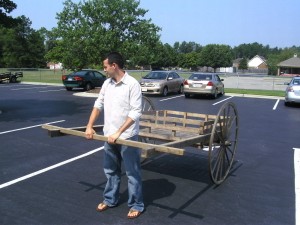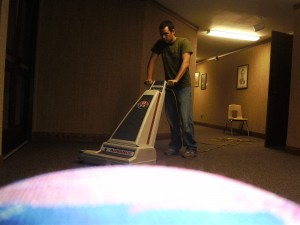Imagine a mob waiting to beat and expel you everywhere you go. Imagine fearing for your life, liberty, and family all in the name of faith. Imagine being hated, scorned, and ridiculed…all because of your faith.
How long would that faith last?
When Joseph Smith, Jr. revealed the Book of Mormon and his call by Heavenly Father and Jesus Christ to restore the church, many in his community and the surrounding area of western New York state converted and joined him. The church, despite rising tension among other Christian communities, grew rapidly and soon Joseph Smith was called to gather the Saints in Independence, Missouri where the Saints were to build Zion (New Jerusalem). This mission and journey marked the beginning of the most arduous and tragic years of LDS history.
In settlement after settlement, mobs of anti-Mormons and apostates violently harassed, threatened, and attacked the Saints. Just as members of the church built their sacred temples, first in Kirtland, Ohio, and Nauvoo, Illinois, in order to receive special ordinances and receive the priesthood keys from heaven, they were soon driven out by unsympathetic communities. The persecution of the LDS church reached its zenith when the prophet Joseph Smith, his brother Hyrum Smith were martyred in Carthage Jail on June 27th, 1844, after being arrested on false charges.
Soon after Brigham Young was confirmed and sustained as the new president and prophet of the church, the Saints began their famous 1500 mile exodus from Nauvoo, Illinois toward the Rocky Mountains in search of peaceful settlement. Several groups numbering in the thousands abandoned the city and locations around the country, including England, to settle out West. One such group left their home in New York state and set sail for California aboard the Brooklyn.
Because of the difficult terrain, poverty of the saints, and unimaginable distance, these pioneers sold or abandoned all except what they could carry on a small handcart.

Each cart could hold between 80 and 100 pounds. Imagine fitting your whole life, everything you and your family owns, in this one little cart. Imagine crossing the great American Plain, 1500 miles of rivers, grassland, harsh winters, and mountains suffering unimaginable hunger, fatigue, and pain…all for the freedom to believe.
One man recalled the hardships of the journey,
“I have pulled my handcart when I was so weak and weary from illness and lack of food that I could hardly put one foot ahead of the other. I have looked ahead and seen a patch of sand or a hill slope and I have said, I can go only that far and there I must give up, for I cannot pull the load through it. … I have gone on to that sand and when I reached it, the cart began pushing me. I have looked back many times to see who was pushing my cart, but my eyes saw no one. I knew then that the angels of God were there.”
Many people died due to hunger, exposure, and illness along the way. Many abandoned their faith. Other endured until they reached the Salt Lake Valley. When President Brigham Young, sick with mountain fever, looked out on the valley on July 24, 1847, he is reported to say, “It is enough. This is the right place.”
The trail blazed by this first group of pioneers led the way for over 62,000 LDS members from all over the world to settle in what would become Salt Lake City, Utah.
This is, of course, an abriviated history of the church’s exodus west. For a full version, complete with the trials and suffering of the people, visit this page of the official Latter-day Saints website.
As I participated in the Pioneer Day celebration with my local LDS branch last Saturday and watched members of the church load down those replica hand carts, I caught a glimpse of what these people went through for freedom. They endured persecution everywhere they set foot. We see many cases throughout history where people migrate to escape religious persecution. The first settlers to America in fact came, in large part, to find land where they could worship freely. Such trials force me to consider my own faith and the faith of those around me.
Could I endure such hardships for my beliefs? Would I leave my home and property and travel across inhospitable terrain, suffer potential harm from unsympathetic mobs, and risk the safety of my family, all for faith? Could you do it? I think we take our freedom to worship (and for some of us, the freedom from worship) for granted. We inherited our rights and therefore did not have to pay them with sweat, blood, and suffering. How easy it is to wake up on Sunday and take a leisurely drive to church or wherever your place of worship is. If you had to face an angry mob or a deadly storm just to attend services…would you go?
How strong is your faith today? Could you be a pioneer?

